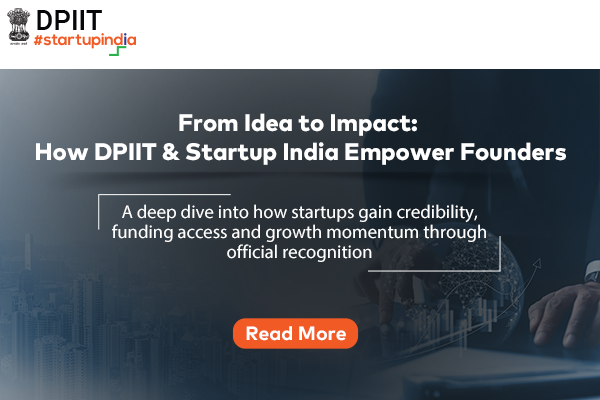India’s transformation into a global startup hub, with over 1.74 lakh recognized startups as of April 2025, is powered by the Department for Promotion of Industry and Internal Trade (DPIIT) and the Startup India initiative. Launched in 2016, these frameworks have catalyzed innovation, job creation, and economic growth by providing regulatory support, funding, and a culture of entrepreneurship. This article explores their pivotal role in shaping India’s innovation economy, drawing on recent data and ecosystem trends.
DPIIT: The Backbone of Startup Policy
The DPIIT, under the Ministry of Commerce and Industry, drives industrial growth through policies that foster entrepreneurship. Its recognition program, integral to Startup India, validates startups’ innovation and scalability, unlocking a suite of benefits that reduce operational and financial burdens.
Key DPIIT Benefits
- Tax Exemptions: 100% income tax deduction under Section 80-IAC for three years (post-Inter-Ministerial Board approval) and angel tax exemption under Section 56(2)(viib).
- Regulatory Simplification: Self-certification for nine labor and three environmental laws for five years, cutting compliance costs by 30–50%.
- IP Support: Fast-track patent/trademark applications with up to 80% fee rebates, enabling 10,000+ startups to secure IP since 2016.
- Public Procurement: Access to Government e-Marketplace (GeM), generating ₹1,200 crore in orders for startups in 2024.
- Faster Exits: Simplified winding-up processes under the Companies Act, reducing closure timelines to 90 days.
Impact
DPIIT recognition has empowered 1.74 lakh startups, with 60% in Tier II/III cities like Jaipur and Coimbatore. In 2024, recognized startups raised ₹90,000 crore in funding, per DPIIT reports, and created 15 lakh jobs. By easing entry barriers, DPIIT enables startups to focus on innovation, aligning with India’s $5 trillion economy goal by 2027.
Startup India: Catalyzing Entrepreneurial Growth
Launched on January 16, 2016, Startup India is a flagship initiative to foster a startup-friendly ecosystem through simplification, funding, and partnerships. Its digital hub, the Startup India Portal, serves 1.5 million users annually, offering resources, networking, and access to schemes.
Core Pillars
- Simplification and Handholding:
- The portal streamlines registration, DPIIT recognition, and compliance via BHASKAR (Bharat Startup Knowledge Access Registry).
- Self-certification reduces inspections, saving startups ₹2–5 lakh annually in compliance costs.
- Funding and Incentives:
- Startup India Seed Fund Scheme (SISFS): Disbursed ₹600 crore to 2,000+ startups in 2024 for prototyping and market entry.
- Fund of Funds for Startups (FFS): ₹10,000 crore allocated via SIDBI to VCs, catalyzing ₹48,000 crore in startup investments.
- Credit Guarantee Scheme (CGSS): ₹10 crore collateral-free loans, with 5,000+ startups benefiting in 2024.
- Industry-Academia Partnerships:
- Collaborations with 1,800+ incubators (e.g., T-Hub, IIT Madras) provide mentorship and infrastructure.
- Programs like Investor Connect facilitated 1,200+ funding deals in 2024.
Digital Ecosystem
The Startup India Portal offers:
- Learning Resources: 50+ modules on fundraising, compliance, and marketing, accessed by 1 lakh startups in 2024.
- Networking: Events like Startup Mahakumbh connected 2,000 startups with investors.
- GeM Integration: Enabled ₹1,200 crore in government orders for startups.
Fueling India’s Innovation Economy
DPIIT and Startup India have transformed India into the world’s third-largest startup ecosystem, behind the US and China. Key contributions include:
- Job Creation: Startups created 15 lakh direct and indirect jobs by 2025, per DPIIT, with sectors like fintech (e.g., Razorpay) and edtech (e.g., BYJU’s) leading.
- Economic Impact: Startups contributed ₹3.5 lakh crore to GDP in 2024, aligning with India’s innovation-led growth goals.
- Sectoral Innovation: DeepTech (10,000+ startups), AgriTech (3,000+), and HealthTech (5,000+) address societal challenges like food security and healthcare access.
- Geographic Inclusion: 60% of startups are in Tier II/III cities, with hubs like Bhubaneswar and Indore emerging, democratizing innovation.
Cultural Shift: Redefining Entrepreneurship
Beyond policies, Startup India has reshaped mindsets. Entrepreneurship, once seen as risky, is now a respected career path, with 70% of surveyed youth in 2024 aspiring to start ventures, per NASSCOM. Initiatives like Startup Yatra, reaching 1 million students across 500+ colleges, inspire first-time founders. Corporate partnerships (e.g., Google for Startups) and government-backed incubators foster a collaborative ecosystem.
Challenges and Opportunities
- Challenges:
- Funding Gaps: Only 10% of startups secure SISFS funding due to high competition.
- Compliance Complexity: Despite simplifications, 15% of startups face delays in DPIIT approvals due to incomplete documentation.
- Rural Reach: Tier III cities need more incubators to match metro hubs.
- Opportunities:
- Expand SISFS to ₹2,000 crore annually to support 5,000+ startups.
- Leverage AI-driven tools on the portal for automated compliance and funding applications.
- Strengthen global partnerships, like with G20 nations, to boost startup exports (₹8,000 crore in 2024).
Conclusion
DPIIT and Startup India are the cornerstones of India’s innovation economy, empowering 1.74 lakh startups with tax breaks, funding, and simplified compliance. By fostering innovation in sectors like DeepTech and AgriTech, creating 15 lakh jobs, and enabling ₹1,200 crore in GeM orders, these initiatives drive economic and social impact. Founders should register on the Startup India Portal, secure DPIIT recognition within 60 days, and leverage resources like SISFS and incubators to scale. As India aims for a $5 trillion economy, DPIIT and Startup India will continue to shape a future where innovation thrives across metros and Tier III cities alike.
Disclaimer: This article is for educational purposes and does not constitute financial or legal advice. Verify details with DPIIT or Startup India and consult certified advisors.

